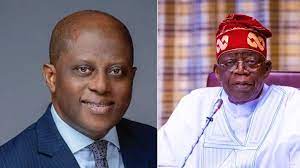Dr. Olayemi Michael Cardoso has been proposed for the position of Governor of the Central Bank of Nigeria (CBN) by President Bola Tinubu. This nomination was made by President Tinubu.
A statement that was released by Ajuri Ngelale, who serves as the presidential spokesperson, made the nomination an official one.
The announcement claims that President Tinubu has granted his consent for Dr. Cardoso to be appointed to the position of leading the Central Bank of Nigeria (CBN) for an initial tenure of five years. On the other hand, the Nigerian Senate has not yet decided whether or not to approve this appointment.
Olayemi, Ph.D. Michael Cardoso, who hails from Lagos, is in line to succeed Folashodun Shonubi as Governor of the Central Bank of Nigeria (CBN), presuming that he is confirmed by the Senate. Cardoso’s appointment is contingent on this.
A further explanation was provided in the presidential statement, which stated that in compliance with Section 8 (1) of the Central Bank of Nigeria Act, 2007, President Tinubu has proposed four deputy governors for the CBN. These nominations are also waiting for approval from the Senate.
The choice made by President Tinubu to designate these critical positions is congruent with his Renewed Hope initiative.
He believes that the appointees will be key in the implementation of crucial reforms within the Central Bank of Nigeria and that they will play pivotal roles in this.
This new development comes as a direct result of President Tinubu’s earlier decision to nominate Folashodun Shonubi to the position of acting governor of the Central Bank of Nigeria. A previous position held by Shonubi at the central bank was that of Deputy Governor in charge of the operations department. This appointment brings him to the position of Governor.
The suspension of former Central Bank of Nigeria Governor Godwin Emefiele, which may be ascribed to continuing investigations into his office as well as planned reforms within the financial sector of the economy of the country, has led to these developments. Since his appointment by former President Goodluck Jonathan in 2014, Emefiele had been serving as Governor of the Central Bank of Nigeria (CBN).
The new CBN deputy governors
In addition, President Tinubu gave his approval to the nomination of four new Deputy Governors of the Central Bank of Nigeria (CBN), each of whom would serve for a term of five years in the initial instance, pending the confirmation of their appointment by the Senate.
Mrs. Emem Nnana Usoro, Mr. Muhammad Sani Abdullahi Dattijo, Mr. Philip Ikeazor, and Dr. Bala M. Bello have all been appointed to positions as new Deputy Governors of the Central Bank of Nigeria.
The President of Nigeria expects the new appointees to successfully implement critical reforms at the Central Bank of Nigeria. This will enhance the confidence of Nigerians and international partners in the restructuring of the Nigerian economy towards sustainable growth and prosperity for all. This agenda is in line with the President’s government’s Renewed Hope agenda.
About CBN
The CBN Act of 1958 established the Central Bank of Nigeria as Nigeria’s central bank and apex monetary authority. The CBN began operations on July 1, 1959, after it was given the right to do so by the CBN Act.
The Central Bank of Nigeria (CBN) serves as the current account administrator for deposit money banks. Additionally, it offers clearing house facilities, which are utilised in the processing and settlement of instruments provided by banking institutions. In a similar vein, it performs functions related to trade finance on behalf of the clients of banks.
The Central Bank maintains control over the commercial banks by adjusting the bank rate upwards or downwards depending on the circumstances.
Through the effective, efficient, and transparent implementation of monetary and exchange rate policy and administration of the financial sector, the Central Bank of Nigeria aspires to be proactive in providing a stable framework for the economic development of Nigeria. This would be accomplished through the bank’s provision of a stable framework.




